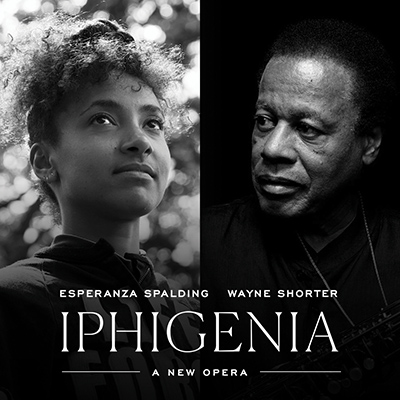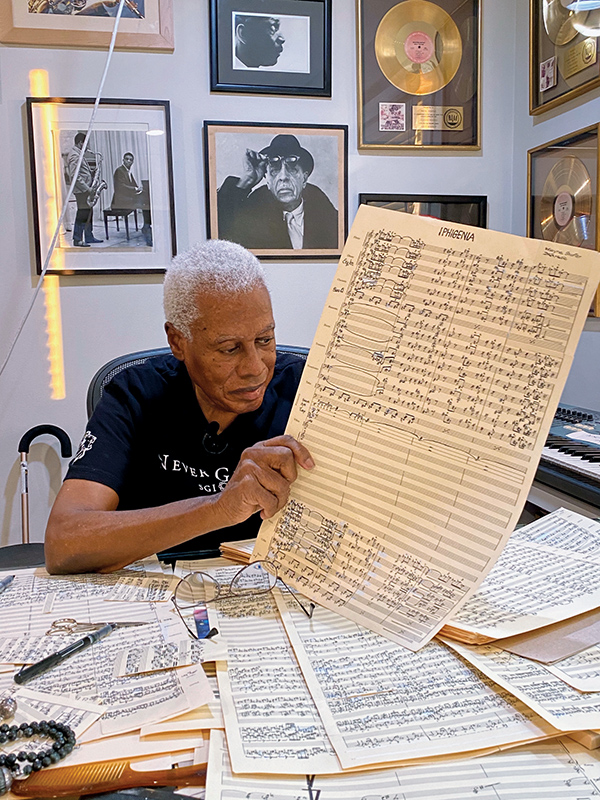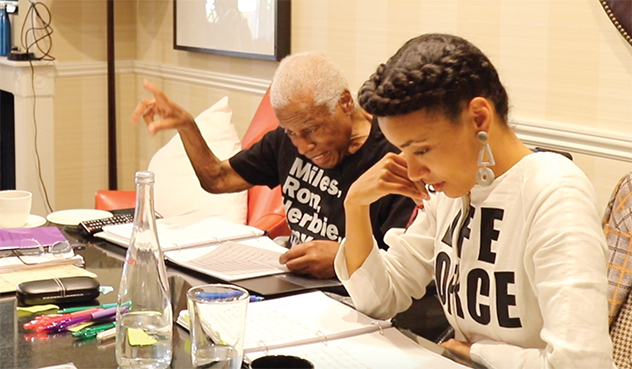Iphigenia: New Opera Reimagines Ancient Myth

photographed by Holly Andres. Wayne Shorter photographed by
Robert Ascroft.
As theaters reopen, few stage productions are as eagerly anticipated as the new opera by jazz luminaries Wayne Shorter and Esperanza Spalding, Iphigenia. Their re-imagining of an ancient Greek myth will have its world premiere on November 12 and 13 at the Emerson Cutler Majestic Theatre in Boston, presented by ArtsEmerson. Other co-commissioners hosting the production over its four-month tour are: the John F. Kennedy Center for the Performing Arts; Cal Performances at the University of California, Berkeley; and the Broad Stage in Los Angeles.
An 11-time Grammy winner, and a National Endowment for the Arts Jazz Master, Shorter, 88, has wanted to create an opera since he was 19. He and Spalding are reworking the last surviving play of the ancient Greek playwright Euripides, Iphigenia at Aulis. Its title character is a young woman about to be sacrificed to secure victory for Greece in the Trojan War. In its final moment, Euripides suggests an alternative fate: witnesses announce that the goddess Artemis spares her.
“Euripides, in his last dramatic work, questions whether the myth ends in tragedy or not,” said Shorter during a recent online Q&A conducted by soprano Renée Fleming to raise funds for the tour’s student programs and discounted tickets. “He is trying to say something new without being executed, like Socrates, who was forced into taking poison. He presented a puzzle.”
In Spalding, who wrote the libretto and will perform the title role, Shorter found an equally visionary partner for a collaborative endeavor to disrupt mythmaking and opera traditions, including their endless lineage of tragic heroines. Both bring to this project virtuoso musicianship as well as an appetite for the unscripted give-and-take of improvisation that is native to jazz.
Spalding, 36, a four-time Grammy winning bassist, vocalist, composer, and lyricist, is a spellbinding performer who concocts magical improvisatory performances in a dazzling range of styles. Spalding has also been a professor of composition and performance at Harvard since 2017, and previously taught at Berklee College of Music, where she graduated in three years with a Bachelor’s in music.

One of the greatest living jazz saxophonists and composers, Shorter finds kinship with opera’s 16th century originators, who wrote instructions for musicians yet left room for improvisation. “We’re having a lot of fun with it,” he says in a September 2018 interview with The New York Times, “because we are in charge of everything ourselves. The first opera was done by Monteverdi—they actually had fun.”
To support what a press release describes as “an environment of radical experimentation and open collaboration,” Spalding and Jeff Tang, the production’s executive creative producer, founded a company, Real Magic, to produce Iphigenia.
Drawn to Shorter and Spalding, the creative team is itself a cast of stars. The director is Lileana Blain-Cruz, whose many honors include 2019 and 2017 Obie Awards, the latter for directing Suzan Lori-Parks’ The Death of the Last Black Man in the Whole Entire World at Signature Theatre. Designing the sets is famed architect Frank Gehry, a long-time friend of Shorter. Costume designer Montana Levi Blanco, lighting designer Jen Schriever, and U.S. Poet Laureate Joy Harjo are also among the production’s host of top-notch contributors.

Like opera’s Renaissance originators, Shorter composed a score that engages other voices. He developed the score, which combines surging symphonic segments and intimate ensemble and solo improvisation, with the long-time members of his quartet: drummer Brian Blade, bassist John Patitucci, and pianist Danilo Pérez. They will perform throughout the tour along with a chamber orchestra of musicians local to each city. In Boston, Jeff “Tain” Watts will be the drummer.
While performing the title role, Spalding will also lead and join each city’s chorus of nine local vocalists, many with traditional operatic training. “There are moments asking for improvisation,” Spalding tells Fleming in the online Q&A. “With love and safety, opera singers are willing to explore and improvise. You discover you have wings—an antigravity device you never knew you had.”
Responsive to Shorter’s score, Spalding’s libretto follows Iphigenia on a circuitous path to freedom. In some scenes, she creates multiple versions of Iphigenia, fracturing and liberating her identity.
“Esperanza challenges the absurdity of this myth,” says Blain-Cruz, speaking by phone several weeks before the premiere. “Men must kill a young woman so they can go to war. Why repeat what does not work? What does it feel like to be a young woman thrust into this absurd story?
“The energy of the music shifts between dense orchestral passages and moments in which we hear individual voices. A wonderful collision of influences and forms explodes the familiar. This ride will be fun, powerful, strange, dark, and exciting—all that you hope to experience in the theater.”
